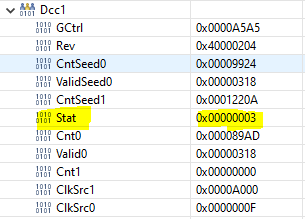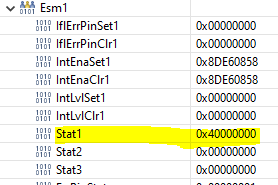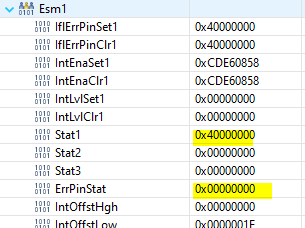Part Number: TMS570LC4357
Other Parts Discussed in Thread: HALCOGEN
Hi Team,
I recently started working on the ESM module of TMS570LC4357. I'm looking for some detailed description or an example to configure and produce an error to check the ESM functionality since im not getting an expected result.
Steps I followed after reading the manual and the questions from the forum to inject DCC error and check the ESM functionality:
Halcogen configurations:
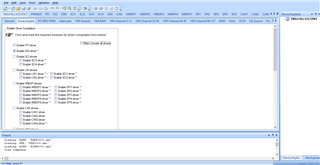
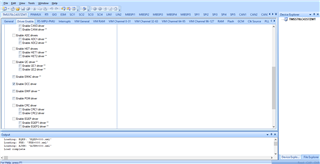
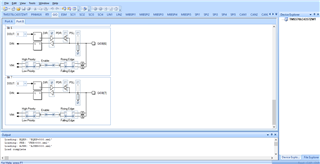
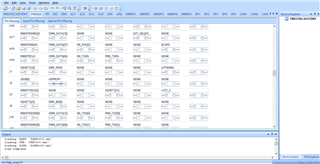
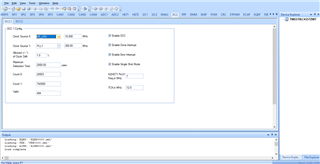
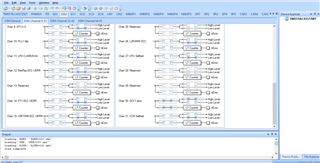
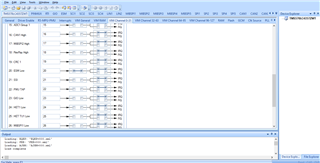
Code:
/** @file HL_sys_main.c
* @brief Application main file
* @date 11-Dec-2018
* @version 04.07.01
*
* This file contains an empty main function,
* which can be used for the application.
*/
/*
* Copyright (C) 2009-2018 Texas Instruments Incorporated - www.ti.com
*
*
* Redistribution and use in source and binary forms, with or without
* modification, are permitted provided that the following conditions
* are met:
*
* Redistributions of source code must retain the above copyright
* notice, this list of conditions and the following disclaimer.
*
* Redistributions in binary form must reproduce the above copyright
* notice, this list of conditions and the following disclaimer in the
* documentation and/or other materials provided with the
* distribution.
*
* Neither the name of Texas Instruments Incorporated nor the names of
* its contributors may be used to endorse or promote products derived
* from this software without specific prior written permission.
*
* THIS SOFTWARE IS PROVIDED BY THE COPYRIGHT HOLDERS AND CONTRIBUTORS
* "AS IS" AND ANY EXPRESS OR IMPLIED WARRANTIES, INCLUDING, BUT NOT
* LIMITED TO, THE IMPLIED WARRANTIES OF MERCHANTABILITY AND FITNESS FOR
* A PARTICULAR PURPOSE ARE DISCLAIMED. IN NO EVENT SHALL THE COPYRIGHT
* OWNER OR CONTRIBUTORS BE LIABLE FOR ANY DIRECT, INDIRECT, INCIDENTAL,
* SPECIAL, EXEMPLARY, OR CONSEQUENTIAL DAMAGES (INCLUDING, BUT NOT
* LIMITED TO, PROCUREMENT OF SUBSTITUTE GOODS OR SERVICES; LOSS OF USE,
* DATA, OR PROFITS; OR BUSINESS INTERRUPTION) HOWEVER CAUSED AND ON ANY
* THEORY OF LIABILITY, WHETHER IN CONTRACT, STRICT LIABILITY, OR TORT
* (INCLUDING NEGLIGENCE OR OTHERWISE) ARISING IN ANY WAY OUT OF THE USE
* OF THIS SOFTWARE, EVEN IF ADVISED OF THE POSSIBILITY OF SUCH DAMAGE.
*
*/
/* USER CODE BEGIN (0) */
/* USER CODE END */
/* Include Files */
#include "HL_sys_common.h"
/* USER CODE BEGIN (1) */
#include "HL_het.h"
#include "HL_gio.h"
#include "HL_reg_gio.h"
#include "HL_dcc.h"
#include "HL_reg_dcc.h"
#include "HL_esm.h"
#include "HL_reg_esm.h"
#include "HL_hal_stdtypes.h"
/* Standard includes. */
#include <stdio.h>
#include <stdlib.h>
/* USER CODE END */
/** @fn void main(void)
* @brief Application main function
* @note This function is empty by default.
*
* This function is called after startup.
* The user can use this function to implement the application.
*/
/* USER CODE BEGIN (2) */
uint64 channel_status;
uint32 ErrPin_State;
void delay(void);
void blinky(void);
/* USER CODE END */
int main(void)
{
/* USER CODE BEGIN (3) */
int i;
ErrPin_State=3U;
esmInit(); // Initializing the ESM driver
dccInit(); // initializes the DCC module
gioInit(); // Initializes the GIO module
gioSetDirection(gioPORTB, 0xff); // Setting port B direction as output
esmActivateNormalOperation(); // Activates normal operation mode
dccEnable(dccREG1); // This function enables the dcc counters to begin counting.
dccSetCounter0Seed(dccREG1,0U); // sets the seed value for Clock source 0 counter.
dccGetErrStatus(dccREG1); // Returns the error status of selected dcc1
esmSetCounterPreloadValue(ESM_LTCPR_CONFIGVALUE); // Setting counter pre-load value (esmREG->LTCPR = value & 0xC000U;)
esmEnableInterrupt(esmCHANNEL30); // Enabling Group-1 Channels Interrupts
esmSetInterruptLevel(esmCHANNEL30,1); // Setting Group-1 Channels Interrupts levels for channels 0-63.
channel_status = esmGetStatus(esmGROUP1,esmCHANNEL30); // Return's the channels status of group1
// 0 - No error, no interrupt is pending 1 - Error occurred, interrupt pending
ErrPin_State = esmError();
//esmTriggerErrorPinReset();
/* USER CODE END */
return 0;
}
/* USER CODE BEGIN (4) */
/* USER CODE END */
I am testing some code that monitors the ESM flags in group 1. With this error, the pin state is always high.
How can I inject DCC error OR in ESM?


